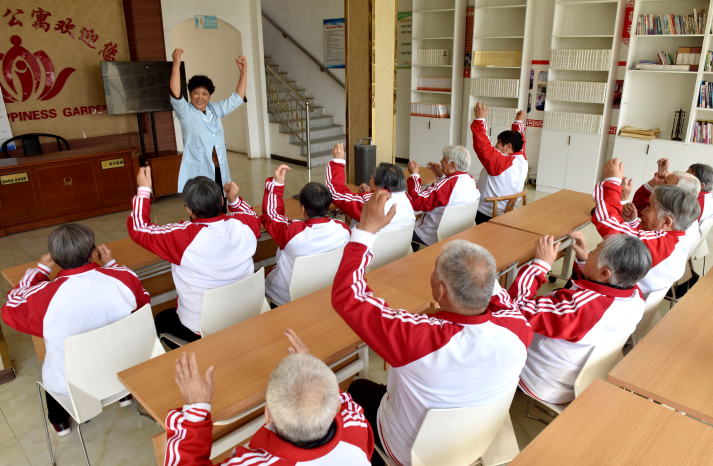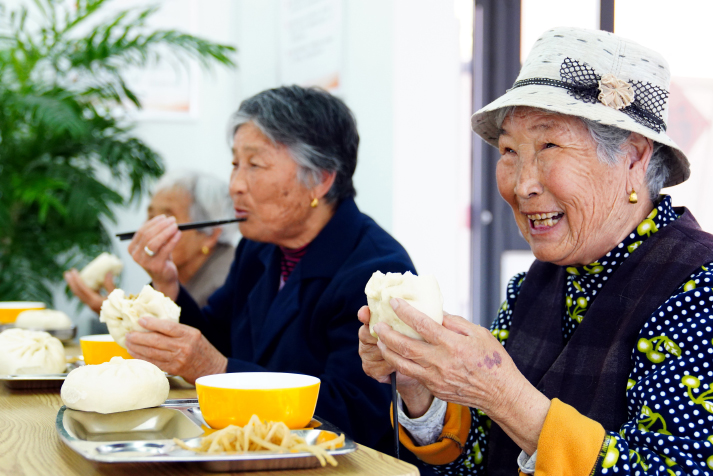| China |
| First undergraduates majoring in elderly care will graduate this summer | |
|
|
 Seniors exercise under the guidance of a staff member at a nursing home in Weixian, Xingtai, Hebei Province, on April 16 (XINHUA)
As many graduating students are still busy hunting jobs, Liu Jiayun, a senior at the Shanghai University of Engineering Science (SUES), has already secured one that is a good match for her education.
Liu has found a job with Shanghai Elderly Care Service Association. She told China Youth Daily that by working for the organization, she will have the chance to work with more than 1,000 member organizations and gain a better understanding of the development of the city's elderly care industry. In 2020, Liu chose to take the newly introduced Elderly Service Management major at the SUES School of Management. During her four years in the program, Liu has gained an understanding of the elderly care industry, its related laws and regulations and how to manage elderly care institutions. Her teachers also helped her find internships with elderly care institutions. She started in the basic role of caregiver and gradually transferred into administrative positions to learn about how the institutions operate. Students of her major are wooed by employers. At a job fair organized by her university on March 19, more than 30 elderly care institutions brought over 120 vacancies to the 33 students set to graduate from the Elderly Service Management program. Mao Jiajie, director of human resources of the Shanghai subsidiary of Taikang Community, a brand under Taikang Insurance Group that focuses on elderly care, nursing, and rehabilitation services, attended the job fair after learning that the university's first undergraduates majoring in Elderly Service Management are about to graduate. He told China Youth Daily the number of employers taking part in the job fair was much higher than he had expected. A nascent initiative Although many junior colleges had already established senior-care-related majors, until four years ago, there were no undergraduate programs for these majors at universities in China. To cope with population aging and promote the development of the elderly care industry, the Ministry of Education and six other departments jointly issued a document encouraging universities to establish undergraduate-level majors related to elderly care, such as home economics and geriatric medicine. In September 2020, SUES and Shandong Women's College in Jinan, Shandong Province, became the first universities in China to establish the Elderly Service Management major. In the following three years, more than 20 universities followed suit. This year, the two universities will see a total of 100 students of this major graduate. Luo Juan, Vice Dean of the School of Management at SUES, told China Youth Daily that her university started to carry out research in elderly service in 2010, laying a solid foundation for establishing the major. Luo said the elderly care related majors within junior colleges primarily aim to train caregivers for elderly care institutions, while the Elderly Service Management major within universities aims to train professionals able to manage these institutions. However, students are also required to master nursing knowledge and skills. "If a manager at an elderly care institution knows nothing about nursing, how can he or she run an elderly care institution?" Luo asked The Economic Observer newspaper. Xu Xiaohuan, general manager of the Shanghai subsidiary of Taikang Community, told The Economic Observer that the elderly care industry has high requirements for the all-round abilities of its management staff. A manager needs to have knowledge of medical care, psychological counseling and culture and entertainment.  Seniors have a meal at a community elderly service center in Rizhao, Shandong Province, on May 10 (XINHUA)
Changing needs Statistics from the National Bureau of Statistics show that the Chinese population is aging rapidly. By the end of last year, the number of people aged 60 and above had reached 297 million, accounting for 21.1 percent of the population. A shortage of management professionals has been a problem hindering the expansion of elderly care institutions. Xu told The Economic Observer that when Taikang Community was established more than 10 years ago, it recruited management personnel mainly from hotels, property management companies and medical industries. In the past, just a few managers and caregivers were enough to operate an elderly care institution. Most caregivers were aged between 40 and 50 and were not well-educated. However, things have become different in recent years as the rapid expansion of the elderly care industry has given rise to higher demand and requirement for professionals. Xu said seniors at elderly care institutions have higher and more diversified demand for the services they receive, giving rise to positions such as fitness instructor. To improve services to meet customers' needs, these institutions urgently need competent management professionals. Against such a backdrop, university graduates with an expertise in elderly care are in high demand in the job market. Chen Shujun, a teacher of the Elderly Service Management major at Shandong Women's College, told China Youth Daily that her university has adjusted its syllabus according to the changing market demand. She said the teachers of the new major come from diverse backgrounds including management, traditional Chinese medicine and nursing. "As the elderly care industry is developing rapidly, we have worked with multiple elderly care institutions and scholars to adapt our courses," she added. Things to be improved In spite of the high demand in the job market, some graduates majoring in Elderly Service Management hesitate about working at an elderly care institution. Lin Manqing, a graduating student majoring in Elderly Service Management at Shandong Women's College, told The Economic Observer that although elderly care institutions provide ample job opportunities for her and her classmates, some of them still prefer to work for the government or state-owned companies or to pursue further studies. Xu said the phenomenon has been caused by the lack of recognition for the elderly care profession. Many regard elderly care as a low-end service industry, which makes it less attractive to college graduates. Luo suggested educating the public about the elderly care industry to increase the popularity of the Elderly Service Management major. Liu Xuehao, a graduating student majoring in Elderly Service Management at Shandong Women's College, is also optimistic about the prospect of the elderly care industry. He is currently interning at an elderly care institution in Qingdao, Shandong Province. As he has learned the traditional Chinese craft of papercutting before, he is teaching it to seniors at the institution. He told China Youth Daily that the elderly care industry is a sunrise industry. In the short term, he plans to learn more skills and accumulate more experience. In the long term, he wants to take up management positions at elderly care institutions. (Print Edition Title: A Sunrise Major) Copyedited by G.P. Wilson Comments to jijing@cicgamericas.com |
|
||||||||||||||||||||||||||||
|